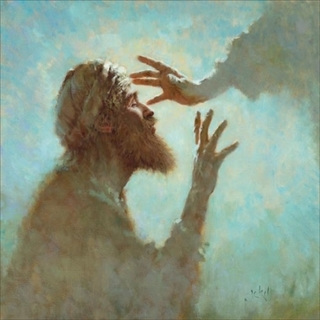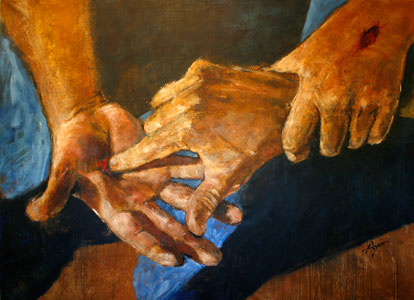+ 18thSunday after Pentecost – September 23rd, 2018 +
Series B: Jeremiah 11:18-20; James 3:13-4:10; Mark 9:30-37
Beautiful Savior Lutheran, Milton
In the Name of the Father and of the + Son and of the Holy Spirit. Amen.
Hey, did you see the game? Yea, wasn’t it great? We got trounced. I love it when that happens. I know what you mean; last night I played Monopoly and had a great time losing all my money, property, and railroads. Yup. Nothing beats being in the back of the line to get into the fair.”
Ever had a conversation like that? Yea, I didn’t think so. After all, no one likes to lose.
It seems from birth, we’re hardwired to think this is way. Greatness is good. Bigger is better. If you’re not first, you’re last. Let’s be honest, Wayne Gretzky isn’t called the “The Great One” for all the hockey pucks that missed the net. Gary Payton didn’t become one of the best two-way guards in the NBA by turning over the ball each possession. Marshawn Lynch didn’t earn the name “Beast Mode” by fumbling the ball every touchdown run.
Greatness is winning, not losing. Strength, not weakness. Power, not mercy. Being Master, not servant. First, not last. This is greatness in the world.
Greatness, according to Jesus, is the exact opposite of the world. Mercy. Sacrifice. Humility. Weakness. Suffering. Death. Jesus reveals his greatest glory for us and his disciples, not on the mountain of Transfiguration but on Mt. Calvary. Not in the healings of Capernaum but in bearing our disease and death on a cross outside Jerusalem. Jesus came to seek and save us who are lost, losers, least, and last.
for he was teaching his disciples, saying to them, “The Son of Man is going to be delivered into the hands of men, and they will kill him. And when he is killed, after three days he will rise.”
This is the second of Jesus’ passion predictions in Mark’s Gospel. In stark, clear words Jesus teaches the disciples that his suffering, death, and resurrection were the heart of his teaching and preaching, and it still is. Jesus’ words reveal the beating heart of the church’s life. In Holy Baptism we’re joined to Jesus’ death and resurrection. His forgiveness won on the cross is delivered again and again in our ears every time we hear his Absolution:you are forgiven all your sins. Jesus’ Words consecrate and hallow simple bread and wine with which he feeds us his body and blood for the forgiveness of sins.
Jesus’ words reveal the Father’s great love for us. It was God’s will that the Son of Man came into the world as a weak and helpless child for you. God’s will that He who knew no sin became sin for us. God’s will to crush him, to lay upon him all our sins, all our delusions of greatness and grandeur. God’s will to make him who was the firstborn of all creation to become the last one, the lowly one, the least, lost, and losing one on the cross for us.
Jesus’ Word reveals how God measures greatness. Not in power but weakness. Not glory but a cross. Not the greatness of winning but the greatness of losing, losing one’s life in order to gain it, in laying down His life as our ransom from Sin and Death.
You can imagine the disciples’ confusion as they walked down the road, talking amongst themselves. “What’s the Teacher talking about betraying and killing for? What’s so great about dying? The feeding of the 5000, the deaf-mute man healed; the unclean spirit cast out. That glowing thing he did on the mountain top in front of Peter, James, and John. Now there’s power, and glory. That’s greatness.”
St. Mark’s indictment is short, but deadly:Theydid not understand the saying, and were afraid to ask him.”
While Jesus proclaimed his death and resurrection, his disciples played their own little game of thrones, arguing with one another about power, glory, and who was greater in the Kingdom of God.
You see, even Jesus’ disciples (then and today) aren’t immune from seeing greatness through the eyes of the world and our fallen sinful flesh, not the eyes and ears of faith. As they came to Capernaum, to the house, Jesus calls them out on it. “What were you discussing on the way?”
The disciples were like children caught in the act. They kept silent. The Law did to them what it does to us all: it shuts us up. God’s Word reveals the truth. That we are in fact the greatest. The Epistle of James says we are like the disciples, great at quarreling, desiring, coveting, at war within ourselves. We are great at comparing ourselves and our sins to others. Great at being selfish and self-serving. Ever notice how easy it is to get a drink from the fridge for ourselves, but when our children or spouse ask us. Ugh. Grumble. Groan. Yes, we are great. Great at putting ourselves first. Great at loving ourselves more than God and the least, lowly, and lost ones. Great and chief of sinners.
If anyone deserves the title Greatest of all time, it’s not us, or the disciples; it’s Jesus. And yet, Jesus turns our notions of greatness completely on their head.
According to Jesus, greatness looks like the Son of Man being delivered into the hands of sinful men. Greatness looks like Jesus, the One who is greater than all, who became the last, the lowly, the least, and the loser on the cross for us. Greatness looks like Jesus who emptied himself, by taking the form of a servant,being born in the likeness of men. And being found in human form, he humbled himself by becoming obedient to the point of death, even death on a cross.
Jesus’ cross is a cosmic “Greater Than” sign that swallows up all our notions of greatness, our sinful pride, even death itself. In Jesus crucified, weakness is greatness. Losers are winners. The lowly are exalted. The last are first. Sinners are justified freely.
To illustrate his teaching, Jesus placed a little boy before the disciples. “Aww, how cute”, we say. But we have to remember that children weren’t idealized or honored in the ancient world. Their social status was no different than a slave or servant. They were helpless, dependent, nobodies. In this way, we are that child: completely and utterly dependent upon God’s mercy to us in Jesus.
True greatness, you see, isn’t found in our greatness, or our humility, or our anything at all for that matter. Greatness is found in Jesus who though he was the greatest, yet for our sakes became the last. Greatness came to us in the weakness of a child born of a Virgin in a manger in Bethlehem, and in the humility of the Suffering Servant on the cross. Greatness comes to us ordinary bread, wine, water, and words that do as Jesus declares: give the greatest gift of all: forgiveness, life, and salvation. Greatness happens when pious parents do the greatest work of evangelism there is in bringing their young ones to be baptized. Baptism, you see, is where it all begins; where we become God’s children. If anyone would be first, he must be last of all and servant of all.”That’s who we are in Christ. Servants, set free from our great sin by our greater Savior.
Faith doesn’t ask who’s the greatest. Faith looks to Jesus crucified and says, “There. That’s greatness.” And through the cross of Jesus, faith looks out into the world and sees Jesus precisely where the world does not look: in the least, the lost, the little, the child.
In the Name of the Father and of the + Son and of the Holy Spirit. Amen.




